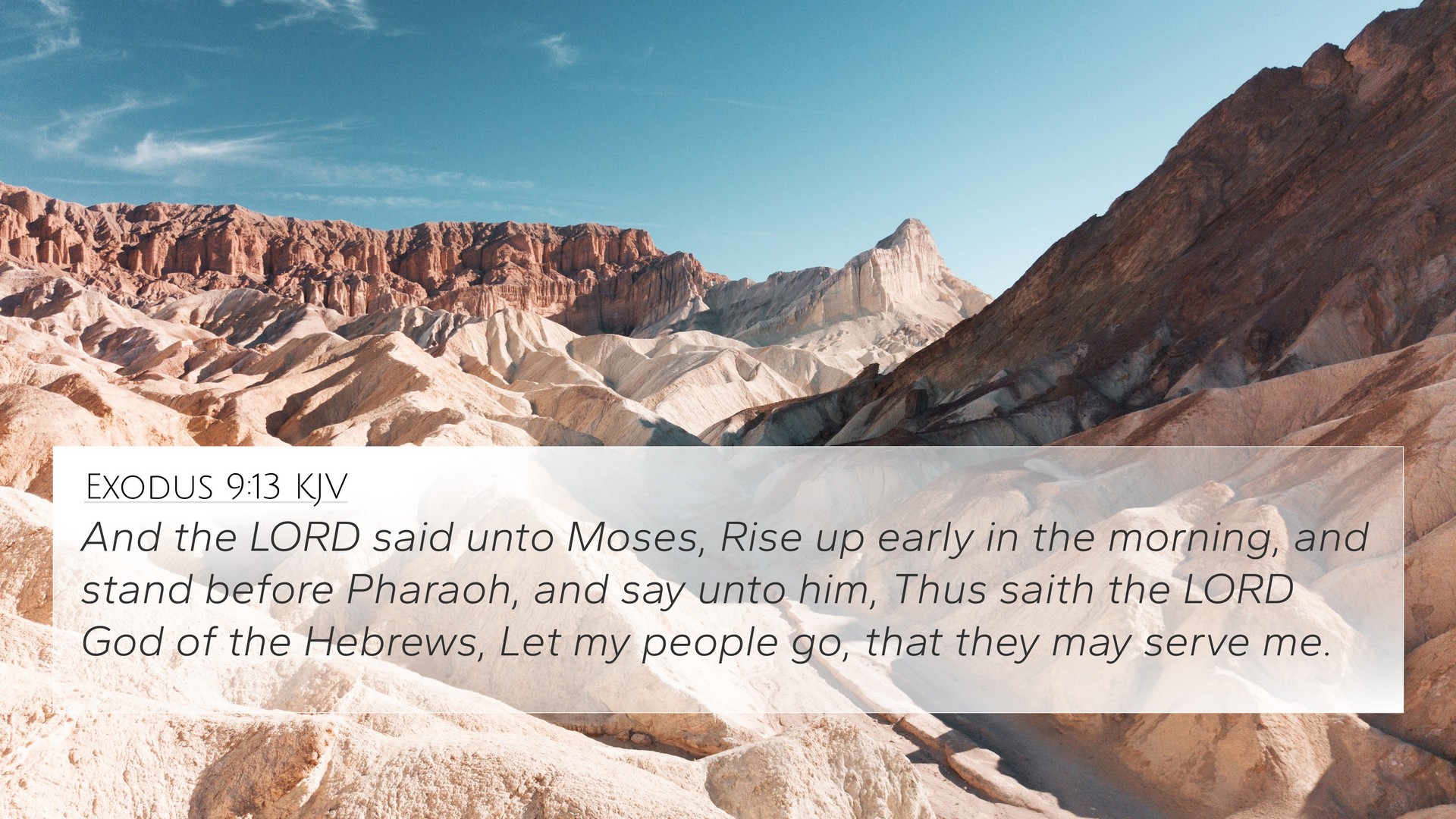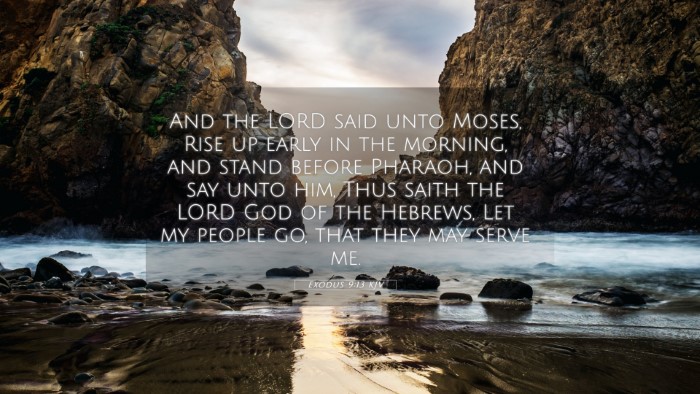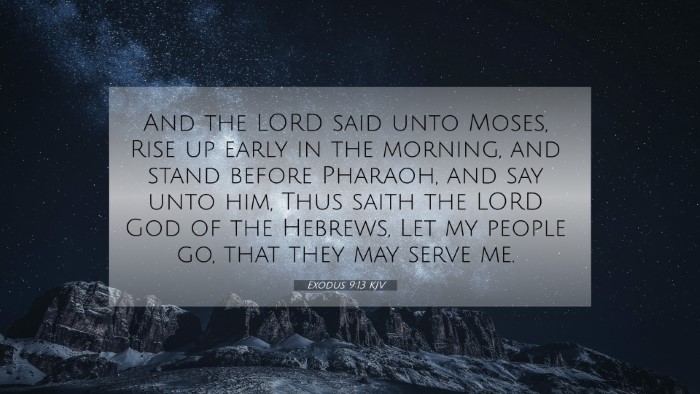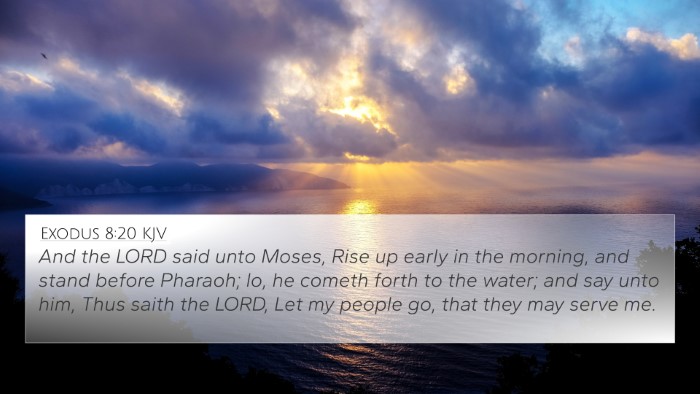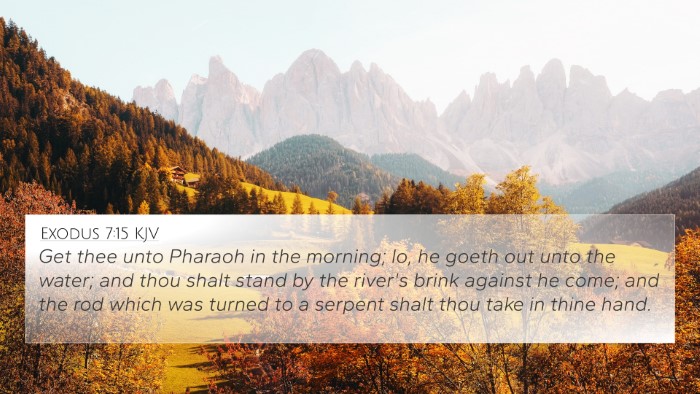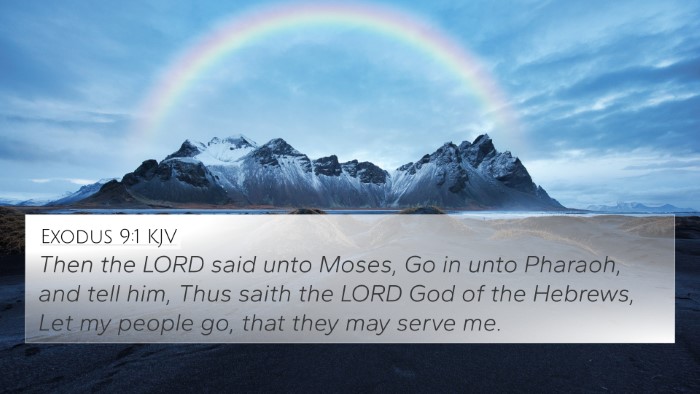Understanding Exodus 9:13
Exodus 9:13 states: “And the LORD said unto Moses, Rise up early in the morning, and stand before Pharaoh, and say unto him, Thus saith the LORD God of the Hebrews, Let my people go, that they may serve me.” This verse is pivotal in the narrative of the Exodus, where God commands Moses to confront Pharaoh once again, emphasizing His authority and the necessity of liberating the Israelites.
Context and Significance
This verse occurs within a series of plagues that God sends upon Egypt as a demonstration of His power and a means to compel Pharaoh to release the Israelites from slavery. Here, God’s command to Moses conveys several profound themes that merit exploration.
Thematic Insights
- Divine Authority: The phrase "Thus saith the LORD" showcases the premise that God is asserting His sovereignty over Pharaoh and Egypt.
- Urgency in Obedience: God's instruction to "rise up early" reflects the importance of readiness and the urgency of obedience in fulfilling divine commands.
- The Call for Worship: The request for Pharaoh to let the Israelites go "that they may serve me" highlights that their liberation is not for mere freedom but for the purpose of worshipping God.
Commentary Insights
Insights from Matthew Henry highlight that this command from God to Moses is intended to reinforce the seriousness of the mission, emphasizing that Pharaoh's hardening heart was known beforehand. Albert Barnes comments on the persistent nature of God's requests, suggesting that they are not solely for the Hebrews' benefit but also serve to display God’s power to the Egyptians. Meanwhile, Adam Clarke elaborates on the significance of the timing in Moses’ actions, indicating a strategic approach in confronting Pharaoh.
Cross-References for Further Study
For those looking to delve deeper into the themes and ideas presented in Exodus 9:13, consider the following Bible cross-references:
- Exodus 3:10: God’s initial call to Moses to lead His people out of Egypt.
- Exodus 5:1: Moses and Aaron confronting Pharaoh for the first time regarding the Israelites’ freedom.
- Exodus 7:16: God's command to Moses to inform Pharaoh about the plagues.
- Exodus 8:1: God reiterating His command to Pharaoh through Moses.
- Psalm 105:26-27: Reflection on how God sent Moses and Aaron as His messengers to carry out His will.
- Romans 9:17: Paul’s reference to Pharaoh's heart being hardened for the manifestation of God’s power.
- Hebrews 11:28: Mention of faith in observing the Passover, which relates to the journey begun in Exodus.
Connecting Themes Across Scriptures
The themes seen in Exodus 9:13 resonate through scripture, creating an inter-Biblical dialogue that links the Old Testament narrative with New Testament teachings. For example:
- Freedom from Oppression: Similar themes of liberation are seen in Galatians 5:1, where Paul emphasizes Christ’s purpose to free believers from the bondage of sin.
- Divine Control Over Kings: Proverbs 21:1 asserts that the heart of the king is in the hand of the LORD, indicating God’s authority over rulers, akin to His command over Pharaoh.
- The Importance of Worship: The call for worship by the freed Israelites in Exodus is illustrated in 1 Peter 2:9, where believers are called a royal priesthood.
Conclusion
Exodus 9:13 serves as a crucial point in understanding God's plan for the Israelites and His power over all earthly authorities. This command is not just historical narrative but a profound revelation of God's enduring purpose and His desire for His people to worship Him freely. As we explore the connections between Bible verses, we uncover deeper insights into themes of authority, liberation, and divine purpose that echo throughout both the Old and New Testaments.
Exploring Bible Verse Connections
Utilizing tools for Bible cross-referencing can enhance one’s understanding of the Bible by identifying connections between verses. By studying these thematic Bible verse connections, one can better comprehend the unity of Scripture and the overarching narrative of salvation. Resources such as a Bible concordance or a cross-reference Bible study guide can aid in identifying these links and enriching one’s study of the Word.
Further Study Suggestions
- How to find cross-references in the Bible: Utilize online tools or printed Bible reference resources that outline relationships among scriptures.
- Comparative study of Pauline epistles: Looking at how Paul references Old Testament themes can provide insight into Exodus 9:13.
- Bible cross-reference for sermon preparation: Employ the thematic connections in Exodus 9:13 to inspire sermon outlines or Bible study discussions.
